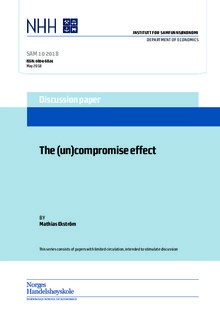The (un)compromise effect
Working paper

Åpne
Permanent lenke
http://hdl.handle.net/11250/2498240Utgivelsesdato
2018-05Metadata
Vis full innførselSamlinger
- Discussion papers (SAM) [657]
Sammendrag
The compromise effect—i.e., the preference for the middle option—is an established
bias in behavioral economics, but has not been experimentally validated in the field. In
the current study I test the compromise effect in a natural context, and whether this bias
can be used to stimulate active choice—the (un)compromise effect. In a mail fund raiser
for a large US hospital, I evaluate their baseline ask string [$10, $50, $100, $ ] to an
extended version [$10, $50, $100, $250, $500, $ ]. In line with the compromise effect,
the extended ask string increases the average amount given and the share of donors giving
$100, which is now the middle option. Importantly, however, and in line with a model of
contextual inference, revealing the middle option is not necessary for the effect to arise.
The (un)compromise ask string [$10, $500, $ ] generates the same average amount given and same share giving $100, as the extended ask string—the only difference being that 90 percent of donors, instead of 30 percent, use the open-ask alternative. Hence, by only providing informative end points of a distribution, organizations can benefit from the compromise effect and at the same time promote individuality by stimulating active choice. I discuss theoretical and practical implications of the results.